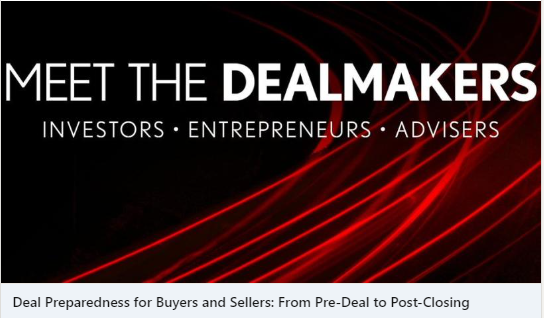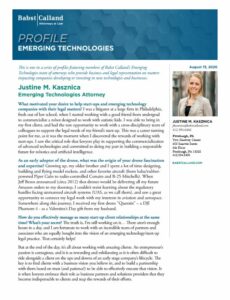
On March 4th, the Pittsburgh Smart Business Dealmakers Conference will bring together middle-market entrepreneurs, investors and advisers to discuss the new landscape for business and what you can do today to keep your business growing.
Join Chris Farmakis and a group of entrepreneurs and industry-seasoned service providers offer a deep dive into how to make sure you’re checking the right boxes before you go to market—during the deal and post-close.
Following Chris’ session, join Chris, Sara Antol and Kevin Wills in the “Babst Calland Networking Room” to learn more about some of the latest trends in transactions, including use of artificial intelligence tools in due diligence and the increasing use of representations and warranties insurance in mid-market size deals.
As a sponsor of this event, we extend a special invitation for you to attend as our guest. Below is a link you can use to register for a complimentary ticket. Thank you, and we look forward to seeing you there!
Register Today!
 For startup companies lacking the cash flow or liquid assets to obtain a traditional bank loan, venture debt could be the answer to help elevate them to the next level.
For startup companies lacking the cash flow or liquid assets to obtain a traditional bank loan, venture debt could be the answer to help elevate them to the next level.
Startups often lack many of the characteristics that would give traditional lenders comfort that a regular commercial loan would be a good deal for them. Venture debt can be an alternative to help bridge the gap to a company’s next valuation.
Read More.
Not only has the global pandemic spawned a race to develop a cure for COVID-19, it has also created a race to the Patent Office to protect the massive investments companies are making in their attempts to develop novel diagnostics, therapies, and vaccines to combat the disease. In the United States, the first inventor to file a patent application that teaches a new and non-obvious way to treat the virus or its effects will be eligible for the limited monopoly that a patent provides. As has been reported, researchers are employing a variety of different mechanisms to attack the virus and it is expected that a significant number of patents will ultimately issue from these efforts.
 While Big Pharma is well-poised to incur the expense of patent filing, including the additional expense of paying for accelerated examination of their applications, smaller concerns may not be in a position to do so. To help small businesses and solo inventors in this regard, the United States Patent Office has announced a program that would fast-track the examination of certain patent applications related to the pandemic. While the typical turn-around time for an Examiner to provide an initial review of a new application is about two years after filing, payment of an extra fee to accelerate examination is also an option. Small businesses and startup companies, however, typically can’t take advantage of this program due to the substantial increased initial cost. To remove this impediment, the new program enables business with less than 500 employees to request accelerated examination of certain COVID-19-related applications with no additional upfront payment. If an application qualifies for the program, the Patent Office promises to fully examine it within a year of being granted prioritized status.
While Big Pharma is well-poised to incur the expense of patent filing, including the additional expense of paying for accelerated examination of their applications, smaller concerns may not be in a position to do so. To help small businesses and solo inventors in this regard, the United States Patent Office has announced a program that would fast-track the examination of certain patent applications related to the pandemic. While the typical turn-around time for an Examiner to provide an initial review of a new application is about two years after filing, payment of an extra fee to accelerate examination is also an option. Small businesses and startup companies, however, typically can’t take advantage of this program due to the substantial increased initial cost. To remove this impediment, the new program enables business with less than 500 employees to request accelerated examination of certain COVID-19-related applications with no additional upfront payment. If an application qualifies for the program, the Patent Office promises to fully examine it within a year of being granted prioritized status.
The program is further limited to therapeutics, vaccines and diagnostic tests that are subject to FDA approval for COVID-19 related uses. FDA approvals include, for example, Investigational New Drug (IND) applications, Investigational Device Exemptions (IDE), New Drug Applications (NDA), Biologics License Applications (BLA), Pre-market Approvals (PMA), and Emergency Use Authorizations (EUA).
As of Thursday, August 20th, there have been 274 applicants with 146 requests having been granted. The program is limited to the first 500 approved applicants.

This is one in a series of profiles featuring members of Babst Calland’s Emerging Technologies team of attorneys who provide business and legal representation on matters impacting companies developing or investing in new technologies and businesses.
Read more.
On Thursday, June 11, 2020, Attorneys Justine Kasznica and Carl Ronald joined the Scott Institute’s Jay Whitacre and Anna Siefken for an informative discussion, “From Idea to Invention to Intellectual Property: What Startups and Innovators Need to Know.” To view this discussion, click here.
Tags: Copyrights,
Due Diligence,
Innovation,
Intellectual Property,
Invention,
Patents,
Startups,
Strategy,
Technology,
Trade Secret,
Trademarks

 For startup companies lacking the cash flow or liquid assets to obtain a traditional bank loan, venture debt could be the answer to help elevate them to the next level.
For startup companies lacking the cash flow or liquid assets to obtain a traditional bank loan, venture debt could be the answer to help elevate them to the next level. While Big Pharma is well-poised to incur the expense of patent filing, including the additional expense of paying for accelerated examination of their applications, smaller concerns may not be in a position to do so. To help small businesses and solo inventors in this regard, the United States Patent Office has announced a
While Big Pharma is well-poised to incur the expense of patent filing, including the additional expense of paying for accelerated examination of their applications, smaller concerns may not be in a position to do so. To help small businesses and solo inventors in this regard, the United States Patent Office has announced a 